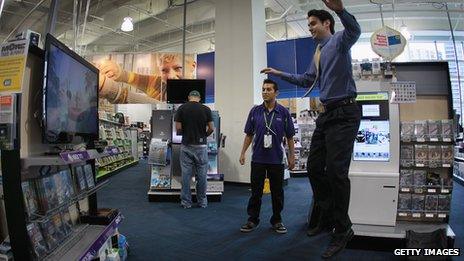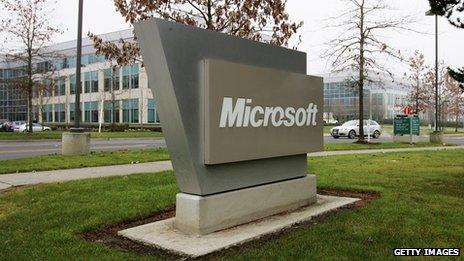Ballmer and the culture of innovation
- Published
- comments
Steve Ballmer: 'This is one of two or three big moments in Microsoft's history'
Steve Ballmer's controversial time as Microsoft's boss has seen the company eclipsed by competitors such as Apple. Will Windows 8 and a new tablet be enough to reverse the trend?
To his Microsoft colleagues he's the forceful, slightly scary leader who has kept his company moving ahead through challenging times and is now about to wow consumers with innovative new products.
But according to Forbes magazine, he's the most disastrous CEO in corporate America, while to Vanity Fair he's the man who has presided over a lost decade, external. Which picture of Steve Ballmer is the most accurate?
When I meet him at his Redmond headquarters, just days before the Windows 8 launch, the Microsoft CEO is unapologetic about his company's record of innovation and its financial performance.
He wants to impress on me just how amazing Windows 8 and the touchscreen mobile devices that use it, will be, while I want to explore why it has been so long since Microsoft delivered anything that makes consumers go "wow".
I suggest that the new Windows Surface tablet - a very attractive and cleverly designed piece of kit that does have the wow factor - has nevertheless missed the boat, arriving long after the iPad and host of other devices. "There's nothing like the Surface," he insists.
"The other things have a purpose but they're nothing like the Surface."
I point out that Bill Gates unveiled a tablet more than a decade ago - so what's gone wrong?
"There's nothing like Microsoft Surface on the market today and I'm real excited about it." he repeats.
Microsoft is packed with clever people, and pours billions into research and development, so why do so many people believe it has delivered nothing much new for the past decade?
That's flat out wrong, he says. Look at Kinect, the XBox motion-capture controller.
Kinect is impressive - and when I visited the Microsoft research centre last year it seemed to have inspired dozens of side projects.

Kinect has been one of Microsoft's biggest recent successes
But looking back over how the world has changed over the last decade, Microsoft seems to have been watching from the wings rather than playing a leading role.
"I would clearly say the most exciting technology product of the last ten years was the Windows PC," Steve Ballmer responds.
"I'm unapologetic about the way PCs over the last 10 years have changed the world."
Now that is one view - but it is difficult to believe that anyone outside the leafy confines of Microsoft's Redmond campus shares it.
The PC has indeed changed the world, but surely that is last century's story. We are moving into the post-PC era.
Reminding the Microsoft CEO that he has presided over a period which has seen its stock market valuation eclipsed by Apple is maybe untactful.
He comes back fighting though, insisting that he is proud of what his company has delivered to investors.
It all makes for a slightly testy encounter.
When we finish he quickly removes the microphone and stands up as if he can't wait to escape, but then kindly stays to give me a quick and impressive demo of Windows 8 on a giant screen.

Microsoft - still a pleasant place to work
Later, I sit with staff in the Microsoft conference centre and watch Bill Gates and Steve Ballmer celebrate 30 years of corporate giving.
It is a moving event at a company whose staff have now given more than $1bn to charity.
Staff rise to applaud their founder, who decided early on that Microsoft had a duty to give something back to the community.
But while there are many impressive things about the corporate culture of Microsoft, my dealings with the company suggest that it has become a lumbering and inefficient bureaucracy.
It may be a nicer place to work than some - but turning ideas into products in a hurry has not been a recent strength.
Now Microsoft needs to prove that Windows 8 is just the start of a new era of innovation.